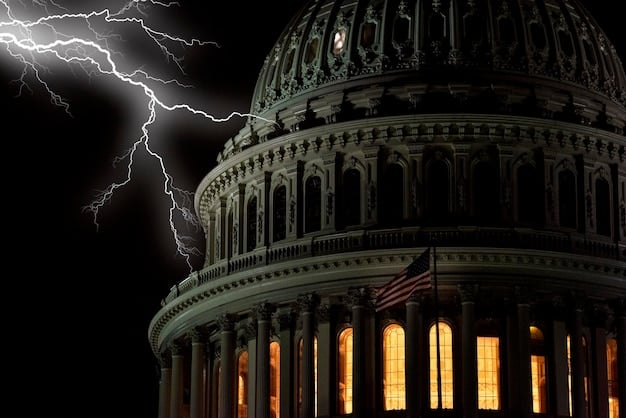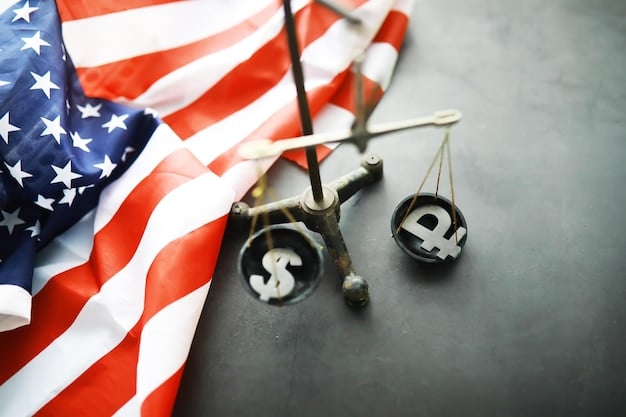How Proposed Campaign Finance Changes Will Impact US Elections in 2026

Proposed changes to campaign finance laws could significantly reshape the landscape of US elections in 2026, influencing who can donate, how much they can give, and the overall role of money in political campaigns.
The way campaigns are funded in the United States is a constant subject of debate and potential reform. Understanding how will the proposed changes to campaign finance laws affect US elections in 2026 is crucial for anyone interested in the future of American democracy.
Understanding Campaign Finance Regulations
Campaign finance regulations in the US are a complex web of laws designed to regulate the raising and spending of money in political campaigns. They aim to ensure transparency, prevent corruption, and promote fairness in elections.
These regulations are constantly evolving, with periodic proposals for reform. Understanding the existing framework is essential to grasp the potential impact of any proposed changes, especially as we look ahead to the 2026 elections.
Key Federal Laws
Several key pieces of federal legislation form the foundation of campaign finance law in the United States. These laws establish contribution limits, disclosure requirements, and regulations on political advertising.
- Federal Election Campaign Act (FECA): This act, originally passed in 1971, is the primary federal law governing campaign finance. It regulates contributions and expenditures in federal elections.
- Bipartisan Campaign Reform Act (BCRA): Also known as McCain-Feingold, this 2002 law amended FECA, addressing issues like soft money and issue advocacy ads.
- Citizens United v. FEC: While not a law, this 2010 Supreme Court decision significantly altered the campaign finance landscape by allowing corporations and unions to make unlimited independent expenditures in political campaigns.
The Role of the Federal Election Commission (FEC)
The FEC is an independent regulatory agency responsible for enforcing campaign finance laws in the United States. It oversees the disclosure of campaign finance information, enforces contribution limits, and investigates potential violations of the law.
The FEC’s effectiveness has been a subject of debate, with some critics arguing that it is often hampered by partisan gridlock and lacks the resources necessary to effectively enforce campaign finance laws.
In conclusion, campaign finance regulations in the US are a complex and ever-changing area of law. The existing framework, shaped by key federal laws and the role of the FEC, provides the foundation for understanding how the proposed changes could affect the 2026 elections.
Proposed Changes to Campaign Finance Laws
Several proposed changes to campaign finance laws are currently being debated in Congress and various state legislatures. These proposals aim to address a variety of issues, including the role of money in politics, the influence of wealthy donors, and the transparency of campaign spending.
These proposed changes could have a significant impact on the way campaigns are financed and conducted in the US, potentially altering the balance of power between candidates and parties.

Potential Areas of Reform
The proposed changes to campaign finance laws often focus on key areas of reform. These include limits on individual and corporate contributions, regulations on so-called “dark money,” and measures to enhance transparency in campaign spending.
- Contribution Limits: Some proposals seek to lower contribution limits for individuals and political action committees (PACs), aiming to reduce the influence of wealthy donors.
- Dark Money: Regulations on “dark money” aim to require disclosure of the sources of funding for political ads and other campaign-related activities by groups that are not required to disclose their donors.
- Transparency: Proposals to enhance transparency include requiring more detailed and timely disclosure of campaign contributions and expenditures, making it easier for the public to track the flow of money in politics.
Arguments for and Against the Changes
The proposed changes to campaign finance laws have generated intense debate, with proponents arguing that they are necessary to reduce corruption and promote fairness, while opponents claim that they would infringe on free speech rights and harm political participation.
Supporters of stricter regulations argue that unlimited campaign spending can distort the political process, giving an undue advantage to wealthy individuals and special interests. Opponents, on the other hand, argue that campaign finance laws are often used to stifle political speech and protect incumbents.
In conclusion, the proposed changes to campaign finance laws represent a significant effort to address perceived problems in the current system. These proposals, focusing on contribution limits, dark money, and transparency, are subject to intense debate and could have a profound impact on US elections.
Impact on the 2026 Elections
The proposed changes to campaign finance laws could have a significant impact on the 2026 elections, affecting everything from fundraising strategies to the types of messages that campaigns are able to communicate.
Candidates and parties would need to adapt to the new regulatory landscape, potentially altering their approaches to campaign finance and voter outreach.
Fundraising Strategies
If contribution limits are lowered or new restrictions are placed on PACs, candidates may need to rely more on small-dollar donors and grassroots fundraising. This could require campaigns to invest more heavily in online fundraising and community outreach efforts.
Candidates might also need to develop more creative fundraising strategies, such as crowdfunding campaigns or fundraising events that appeal to a broader range of donors.
Political Advertising
Regulations on “dark money” could lead to more transparency in political advertising, as groups would be required to disclose their donors.

This could make it more difficult for wealthy individuals and special interests to anonymously influence elections through issue advocacy ads.
Overall Effect on Campaigns
The overall effect on campaigns could be a more level playing field, as candidates would have to rely more on the breadth of their appeal than on the depth of their financial resources. This could lead to more competitive elections and a greater focus on issues and ideas.
However, some observers fear that stricter regulations could also make it more difficult for challengers to unseat incumbents, who often have an advantage in fundraising and name recognition.
In conclusion, the proposed changes to campaign finance laws could reshape the landscape of the 2026 elections, influencing fundraising strategies, political advertising, and the overall dynamics of campaigns. The ultimate impact will depend on the specific details of the reforms and how effectively they are implemented.
Legal Challenges and Implementation
Even if the proposed changes to campaign finance laws are enacted, they are likely to face legal challenges, particularly from groups that argue that they infringe on free speech rights. The implementation of the new regulations could also present significant challenges.
These legal and practical hurdles could delay or weaken the impact of the reforms, making it difficult to predict their ultimate effect on the 2026 elections.
First Amendment Concerns
Opponents of stricter campaign finance regulations often argue that they violate the First Amendment rights to free speech and freedom of association. They contend that the right to spend money on political campaigns is a form of protected expression.
Courts have historically grappled with balancing the First Amendment rights of individuals and groups with the government’s interest in preventing corruption and promoting fairness in elections.
Potential Lawsuits
If the proposed changes are enacted, they are likely to be challenged in court by groups that believe they are unconstitutional. These lawsuits could take years to resolve, potentially delaying the implementation of the reforms.
The Supreme Court has played a significant role in shaping campaign finance law over the years, and its current composition could affect the outcome of any legal challenges to the proposed changes.
Enforcement Challenges
Even if the new regulations are upheld by the courts, the FEC and other regulatory agencies may face challenges in enforcing them. These challenges could include a lack of resources, partisan gridlock, and difficulties in tracking and investigating violations.
Effective enforcement will be crucial to ensuring that the reforms achieve their intended goals of reducing corruption and promoting fairness in elections.
In conclusion, the proposed changes to campaign finance laws face significant legal and implementation challenges. First Amendment concerns, potential lawsuits, and enforcement difficulties could all affect the timing and impact of the reforms on the 2026 elections.
Historical Context of Campaign Finance Reform
The debate over campaign finance reform is not new. Throughout American history, there have been repeated efforts to regulate the role of money in politics, driven by concerns about corruption, undue influence, and fairness.
Understanding this historical context can provide valuable insights into the current debate and the potential impact of the proposed changes.
Early Efforts at Regulation
Early efforts to regulate campaign finance focused on limiting the influence of wealthy individuals and corporations. These efforts often arose in response to specific instances of corruption or perceived abuses of power.
One early example is the Tillman Act of 1907, which prohibited corporations and national banks from contributing money to federal campaigns.
The Post-Watergate Era
The Watergate scandal in the 1970s led to a wave of campaign finance reforms, including the creation of the FEC and the establishment of contribution limits and disclosure requirements.
These reforms aimed to increase transparency and prevent the types of abuses that had occurred during the Watergate era.
The Rise of Soft Money
The term “soft money” refers to funds raised and spent outside the federal campaign finance regulations. This money was often used for party-building activities and issue advocacy ads but was not subject to the same restrictions as hard money.
The Bipartisan Campaign Reform Act of 2002 sought to address the problem of soft money by banning national party committees from raising or spending soft money.
In conclusion, the history of campaign finance reform in the US is one of ongoing efforts to balance the First Amendment rights with the need to prevent corruption and promote fairness in elections. The proposed changes to campaign finance laws are the latest chapter in this ongoing story, building on a long tradition of reform efforts.
Potential Unintended Consequences
While the proposed changes to campaign finance laws are intended to address specific problems, they could also have unintended consequences that could undermine their goals or create new challenges.
Policymakers need to carefully consider these potential unintended consequences as they debate and implement the reforms.
Shifting Money to Other Avenues
If stricter regulations are placed on direct contributions and spending, money could simply shift to other avenues, such as issue advocacy groups or state-level elections, which may be subject to less regulation.
This could make it more difficult to track and regulate the flow of money in politics.
Impact on Smaller Campaigns
Stricter regulations could disproportionately affect smaller campaigns that rely on large contributions from a few donors. These campaigns may find it more difficult to compete with well-funded incumbents or candidates backed by wealthy individuals or groups.
This could lead to less competitive elections and a further entrenchment of power.
Reduced Political Participation
Some observers fear that stricter regulations could discourage political participation by individuals and groups who are wary of disclosing their contributions or activities. This could lead to a decline in civic engagement and a less vibrant democracy.
It is important to strike a balance between transparency and the protection of privacy and freedom of association.
In conclusion, the proposed changes to campaign finance laws could have unintended consequences that could undermine their goals or create new challenges. Policymakers need to carefully consider these potential effects and take steps to mitigate them as they debate and implement the reforms.
| Key Point | Brief Description |
|---|---|
| ⚖️ Contribution Limits | Proposals aim to lower limits for individuals and PACs. |
| 💰 Dark Money | Regulations seek disclosure of funding sources for political ads. |
| 🗳️ Transparency | Requirements for detailed and timely disclosure of campaign finance. |
| 📜 Legal Challenges | Reforms face potential First Amendment challenges in court. |
Frequently Asked Questions
▼
The primary goals include reducing corruption, limiting the influence of wealthy donors, increasing transparency, and leveling the playing field for candidates. These reforms are meant to foster a more equitable democratic process.
▼
Lower contribution limits may shift focus to small-dollar donors and grassroots fundraising. Candidates might need to invest more in online platforms and community outreach to broaden their donor base and encourage smaller contributions.
▼
“Dark money” refers to funds from undisclosed donors, often used for political ads. It raises concerns about hidden influence and lack of transparency, potentially distorting elections without public knowledge of the source.
▼
Challenges often cite First Amendment rights, arguing campaign finance laws restrict free speech. Opponents may claim contribution limits and disclosure rules impede political expression. The Supreme Court could play a crucial role.
▼
Yes, money might shift to unregulated areas or impact smaller campaigns negatively. Reduced participation due to disclosure concerns could also occur. Policymakers must consider and mitigate these potential unintended side effects.
Conclusion
The proposed changes to campaign finance laws represent a significant effort to address long-standing concerns about the role of money in US elections. While the potential impact on the 2026 elections is uncertain, it is clear that these reforms could reshape the landscape of American politics. By understanding the issues at stake and the potential consequences of these changes, voters and policymakers can work together to ensure that elections are fair, transparent, and accountable.





